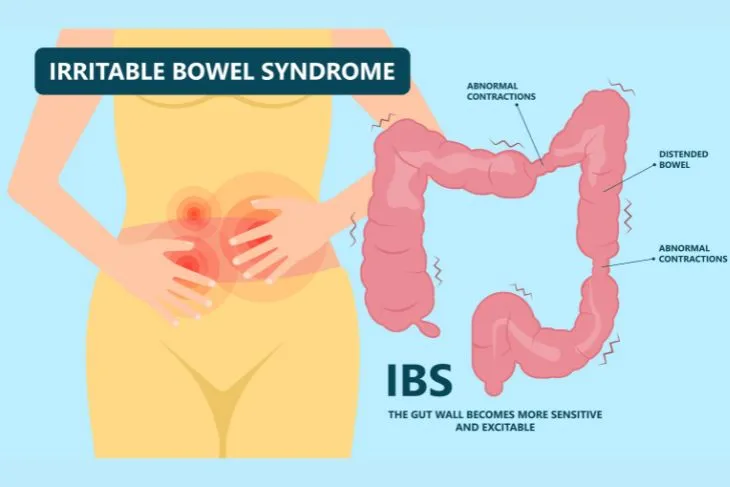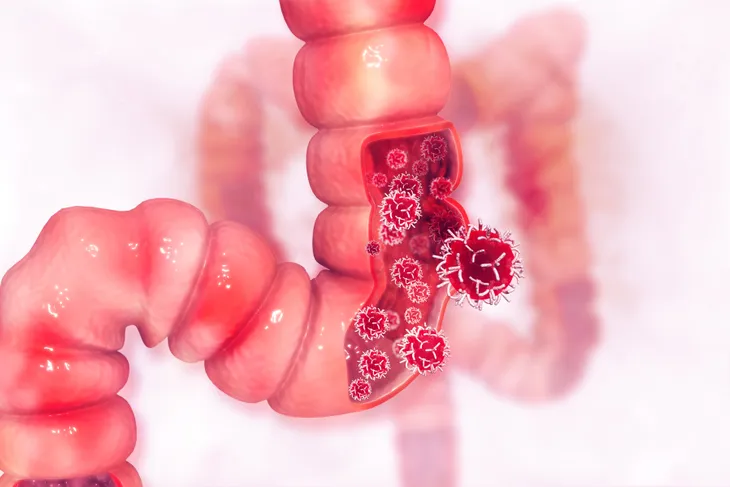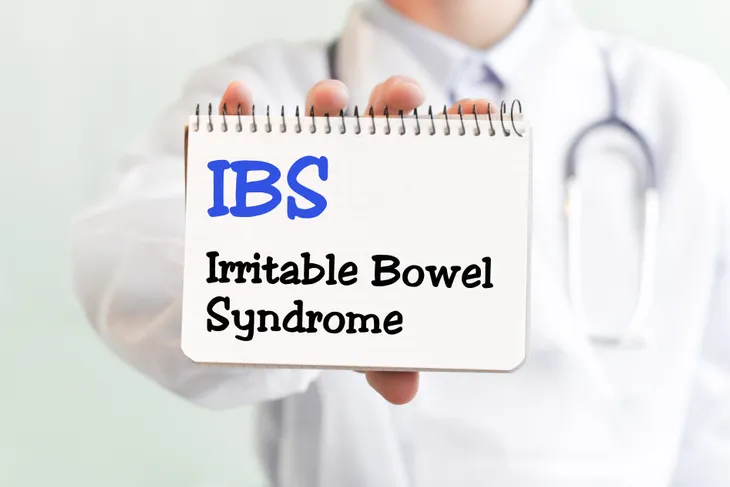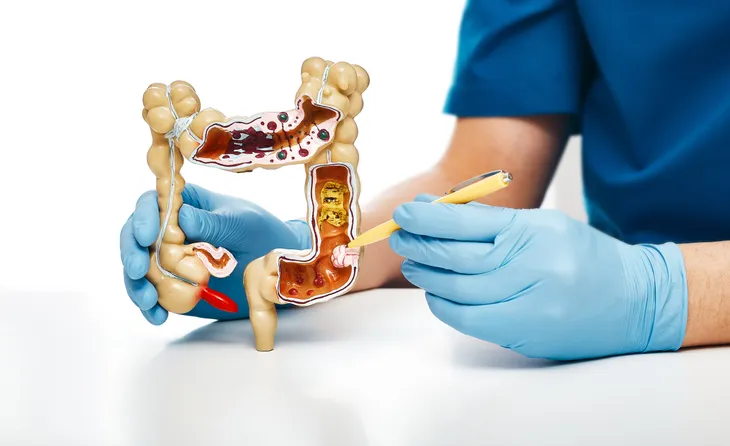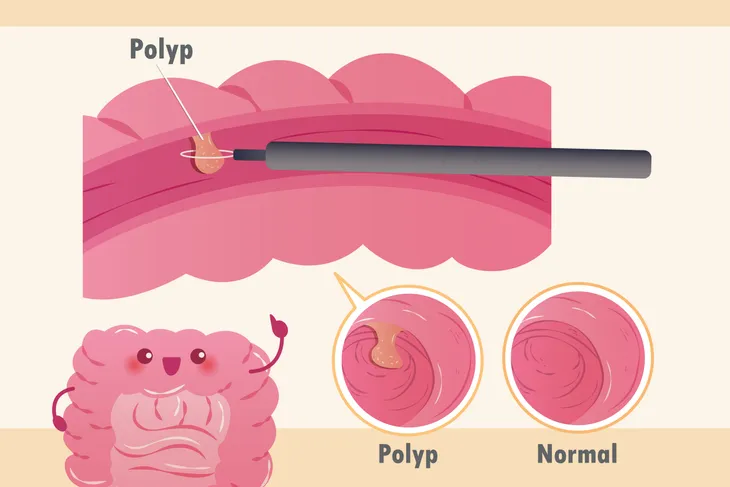- While irritable bowel syndrome and colon cancer are unrelated, they do share many similar symptoms.
- However, symptoms associated with colon cancer will be persistent and get worse overtime.
- You’ll need to see a doctor in order to get an official diagnosis for either one, and to rule out other conditions.
- For colon cancer, an early diagnosis is key for the best chances at treating and curing the cancer.
The human body’s digestive system is complex with a lot of different parts to it, from the stomach to our intestines, which means a lot can go wrong! It can be hard to pinpoint what the cause of our stomachache or bathroom troubles are.
The confusion grows even more by the fact that there are many different digestive diseases and disorders, many of which share similar symptoms. Two of the most frequently confused conditions are irritable bowel syndrome (IBS) and colon cancer. To help, here’s an in-depth look at IBS and colon cancer, in particular how to spot the difference between the two…
What is IBS?
IBS is a gastrointestinal disorder that affects the GI tract with chronic, sporadic, and unpredictable symptoms, says Medical News Today. For the most part, IBS causes a change or disturbance to a person’s bowel function. It often results in abdominal pain, as well as changes to their bowel movements — from diarrhea to constipation, or both.
Unlike other digestive diseases or disorders, IBS causes these symptoms without any visible damage to the digestive tract, notes the source. The exact cause is unknown, but it’s often triggered by stress, anxiety, and certain foods.
What is Colon Cancer?
Colon cancer is a type of cancer that starts in the colon (large intestine) or rectum. These are the two organs that make up the lower portion of the digestive system, explains Healthline. According to the American Cancer Society (ACS), it’s the third most common cancer diagnosed in the U.S., aside from skin cancer.
In 2021, the ACS estimated 104,270 people would receive a diagnosis of colon cancer. This is one of the reasons why healthcare professionals recommend adults over the age of 50 get regular colorectal cancer screenings.
Signs and Symptoms of IBS
Not every person with IBS has the same symptoms. Medical News Today points out that some people will have one or more symptoms. Overall, the most common to occur are abdominal pain with bowel movements and changes in regular bowel movements (i.e. constipation, diarrhea, or both).
Other symptoms that can occurs are a white mucus in the stool, feeling as if a bowel movement is unfinished, and bloating. The source also notes that some women may experience more severe symptoms around their period.
How to Diagnose IBS
To receive an official IBS diagnosis, Healthline explains that a doctor will want to review your medical history (i.e. medications, recent infections, overall diet), as well as any personal or family history of celiac disease, colon cancer, or inflammatory bowel disease.
They will then perform a physical exam to check for abdominal bloating and tenderness. When reviewing any symptoms, they are often looking for a pattern that includes abdominal pain and two or more other symptoms which include:
- Abdominal pain that gets better or worse after a bowel movement
- Bowel movements are less or more frequent than usual
- A change in the appearance of your stools
Additional testing isn’t always necessary to get a diagnosis, says Healthline, but sometimes it’s required to rule out other conditions. These tests include blood tests (check for infections, anemia, and other digestive problems) or a stool test (check for infections, blood, and other diseases).
Signs and Symptoms of Colon Cancer
One of the scariest things about colon cancer is that it doesn’t show symptoms right away. Medical News Today warns that it can take several years for any signs to appear. In addition to that, the ACS notes there are several conditions that cause similar symptoms to colon cancer, so it’s important to go see a doctor to rule all others out during a diagnosis.
Medical News Today lists the following as the most common symptoms of colon cancer:
- Abdominal pain or cramping
- Change in bowel habits, such as a narrowing of the stool, diarrhea, or constipation that lasts longer than a few days
- Dark brown or black blood in stool
- Rectal bleeding that is bright red in color
- Unexplained weight loss
- Weakness or fatigue
How to Diagnose Colon Cancer
Similar to IBS, the first thing a doctor will do is go over your personal and family medical history. According to Healthline, they are looking for key risk factors, such as colorectal polyps, Crohn’s disease, FAP, family history of colorectal cancer, HNPCC, lack of physical activity, poor diet, type 2 diabetes, and/or ulcerative colitis.
The doctor will perform a physical exam, as well as additional testing which may include blood and stool tests, notes the source. If they suspect cancer is present, they’ll want to do a colonoscopy and tissue biopsy, as well as imaging tests (i.e. X-ray or CT scan) of the colon and rectum.
Comparison Between the Two
While it’s clear IBS and colon cancer share many of the same symptoms, there are some key differences between the two. In the very early stages of colon cancer, WebMD notes there often aren’t any symptoms. There won’t be any indicator that colon cancer is present until the disease has grown and spread throughout the body.
In the case of IBS the symptoms will appear only during flare ups, whereas the symptoms of colon cancer are persistent and continue for more than a few days. In addition to the symptoms they share, according to WebMD colon cancer will also present blood in the stool or on toilet paper, fatigue, weakness, narrow stool or difficulty finishing a bowel movement, rectal bleeding and unexplained weight loss.
Can IBS Lead to Colon Cancer?
Unlike irritable bowel diseases (IBD), such as Crohn’s or ulcerative colitis, there is no evidence that IBS can lead to colon cancer. It will cause a lot of discomfort and pain, but it doesn’t result in any inflammation or damage to the GI tract, says Medical News Today.
Most of the time colon cancer begins as a polyp or small growth in the intestine, explains WebMD. People can have polyps in their intestine that don’t ever become cancerous, but some do which means it’s best to just remove them when possible. This is the best form of prevention from colon cancer. WebMD also notes that the earlier a person gets treatment, the easier their cancer is to cure.
Similarities Between IBS and Other Cancers
IBS shares symptoms with other cancers — not just colon or rectal. The Cancer Treatment Centers of America warns that other gastrointestinal cancers like stomach cancer, esophageal cancer, and pancreatic cancer can cause similar symptoms as well.
However, colon cancer is the biggest concern because in addition to being the most common gastrointestinal cancer, it is also the third leading cause of cancer-related fatalities in men and women, according to the U.S. Centers for Disease Control and Prevention (CDC).
IBS Risk Factors
People can have occasional symptoms of IBS or bouts of an upset stomach, but that doesn’t necessarily mean they have this condition. The Mayo Clinic says a person is more likely to have IBS if they are young (under the age of 50) and female. In the U.S., IBS is more common among women, especially if they have undergone estrogen therapy before or after menopause.
Other risk factors include having a family history of IBS because “genes may play a role, as may shared factors in a family’s environment or a combination of genes and environment,” writes the source. As well as if a person has anxiety, depression, or any other mental health issues.
Colon Cancer Risk Factors
Some risk factors are well within our control (i.e. quit smoking), while others are not (i.e. genetics). The most universal risk factor is age. According to Johns Hopkins Medicine, the majority of cases occur in people over the age 50. The source also notes that African Americans and Jewish people of Eastern European descent are at an increased risk.
Things we can control that can impact risk levels are physical activity, being overweight or obese, alcohol use and smoking. For optimal health, eat healthy, exercise regularly, maintain a healthy weight, drink moderately, and avoid smoking.
Be wary of any family history of colon cancer, particularly if an immediate member (i.e. parent, sibling, or child) has had colon cancer. You should also consider personal or family history of polyps or any inherited genetic syndromes. People with IBD should be screened for colon and rectal cancer early and often, warns the source.
When to See a Doctor
Health experts recommend everyone be screened for colorectal cancer on a regular basis after the age 50. If there is a family history of colon cancer these screenings may need to start earlier. However, any occasional bout of abdominal discomfort, constipation, or other related symptoms don’t require a visit to the doctor.
Go see a doctor if symptoms persist or get worse. You should also see a doctor if you notice any rectal bleeding, vomiting, or unexplained weight loss. During this visit they’ll review potential risk factors for cancer. Medical News Today warns that any red flags will likely lead to a CT scan or colonoscopy.
IBS symptoms will need to be evaluated to rule out IBD, an autoimmune disease that causes prolonged periods of inflammation. This is important because IBD can increase a persons risk of developing colon cancer, notes the source.

